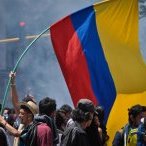English · Español

2 de septiembre de 2016 | Entrevistas | Anti-neoliberalismo | Derechos humanos | Luchadores sociales en riesgo
Peace paradoxes
3 campesinos and 4 indigenous people were killed in Colombia. Interview with Diana Sánchez, member of the Social Committee for Peace in Colombia.
On August 29, just a few hours after wrapping up the final agreement to end the armed conflict between the Colombian State –led by right-wing Juan Manuel Santos– and the leftist guerrilla of the Revolutionary Armed Forces of Colombia (FARC), there was the sad news of the murder of three campesino people in the Department of Cauca. These deaths add up to those of the 4 Awá indigenous people in the Department of Nariño, also in southwestern Colombia in recent days.
Joel Meneses, Nereo Meneses, and Ariel Sotelo, who were murdered in the emblematic department of Colombian popular resistance, were developing territorial defense tasks against the mining extractive model and for saving the water. Joel Meneses was a historic leader of CIMA (Comité de Integración del Macizo Colombiano) and community leader of the Campesino and Indigenous Process of the municipality of Almaguer, PROCAMINA. The two other victims were also working as community leaders of the Colombian Massif, in the same municipality.
According to the statement issued by CIMA, campesino leaders were intercepted by hooded men wearing camouflage uniforms with long guns near a site known as Guayabillas, district of Llacuanas, as they were on their way to the market on this district. Hours later, the three campesinos were found dead by shots within the limits of the municipalities of Bolívar and Almaguer.
Reporter of Radio Real World Danilo Urrea had an interview in Colombia with Diana Sanchez, member of the Social Committee for Peace and director of the Minga Association, an organization that has worked historically in the southwest of the Andean country, to hear her opinion regarding these events.
"It is a paradox and a great contradiction that while significant progress is being made on the negotiation of the conflict between an armed group and the Colombian government, there are still assassinations, attacks and removals of important social leaders and human rights defenders”, said Diana Sanchez.
In the same way, deepening the serious situation created by the killings, this human rights activist added that “these are the realities that Colombia has always suffered and they show that, on the one hand, the end of the armed conflict is not necessarily going to solve the different tensions and other types of violence that are part of the conflict; it will just solve the part considered in the agreement (...) We emphasize that the political opportunity of negotiating the armed conflict must also serve for the government to take stronger measures and structural policies to curve armed groups, which are not insurgent, they could be paramilitary groups or criminal gangs or other organizations who are affected by the important work carried out by the social leadership in the territories” she added.
After welcoming and supporting the agreements reached between the warring parties and inviting everyone to ratify this through the YES vote in the plebiscite of October 2, Sánchez said that despite the importance of the agreement, it does not imply a full peace. “This is a very important step to continue building a peaceful and democratic Colombia, but it is not enough and we believe there is need for progress on the meeting between the government and the ELN, which was agreed on March 30, but that has not been publicly set up”.
Regarding the possibility of the victory of the YES in the referendum called by the government to endorse the agreements reached after more than four years negotiating with the FARC, Sánchez explained that from an analytical and political point of view, in a rational way, the YES vote is not the answer felt by the majority and consensus. “That is problematic, because it is hard to understand how the Colombian people would not unite for the YES to support the ratification. The latest polls show the YES is winning but with a very small margin, and that means that the different sectors committed to peace in the country must put in a lot of effort,” the activist concluded.
Imagen: http://hemisferiozero.com/








